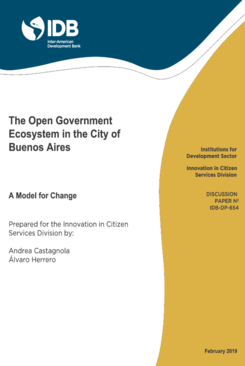The Open Government Ecosystem in the City of Buenos Aires: A Model for Change
Date
Feb 2019
The City of Buenos Aires (CABA) is one of the pioneer cities in the Latin America and the Caribbean region in terms of open government, and forms part of the Subnational Government Pilot Program of the Open Government Partnership. For several years, the city developed diverse initiatives using a participative and innovative management model until, in 2017, the Open Government Ecosystem (www.buenosaires.gob.ar/gobiernoabierto) was established. This initiative combines and enhances all the policies based on open government principles. This paper analyzes CABA’s open government management model both at the center of government and in its organizational culture, as well as its external aspects, such as service provision and citizen relations. The case study places emphasis on two initiatives: Government Commitments and BA Public Works (Compromisos de Gobierno and BA Obras). Government Commitments is a program that introduces more than 50 management goals with measurable targets and that discloses information to enable citizen monitoring. Moreover, the CABA Chief of Government periodically gives an account of the progress on its commitments. For its part, BA Public Works is the first website in the region that openly reports all public works in a single city, detailing when the public works begin and end, how much they cost, and who executes them, as well as posting photographs and videos to monitor progress. The legal documentation relative to the procurement process for each public work can also be accessed. The management model developed in the city is the result of collaborative work among different government ministries. Likewise, the model incorporated participation by citizens and civil society organizations, whereby it has boosted trust in government and accountability. Based on these concrete achievements, CABA’s Open Government Ecosystem still faces the challenge of improving practices to bridge the gap in the feedback loop between ecosystem users and the government.




